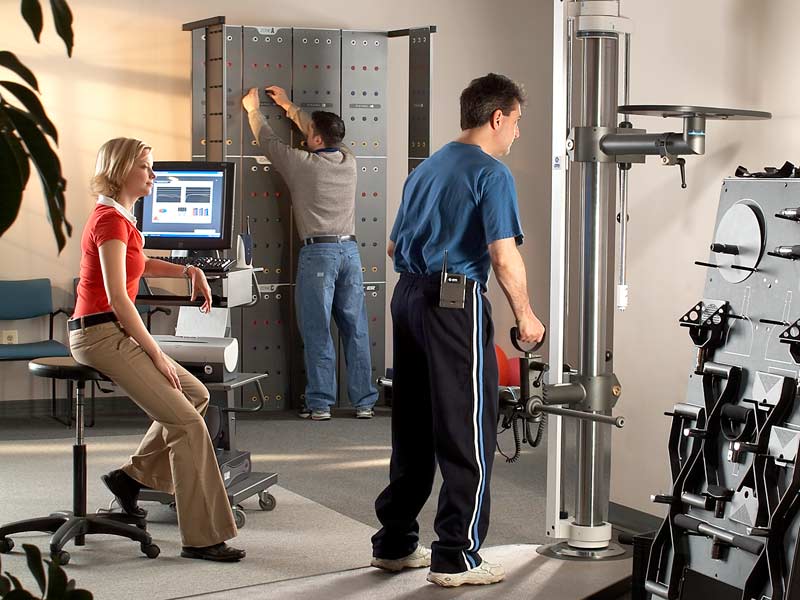
A functional capacity evaluation (FCE) is an objective, functional evaluation of a series of tests administered to help determine current functional and physical status of a patient/client. Not all worker compensation cases need a FCE. Some injuries don’t limit work duties and many times physical and/or occupational therapy provides the healing and assistance to return a patient to work safely. But there are many benefits of a FCE:
- determine if a client has the physical abilities to meet job demands to return to their original work
- determine if work restrictions/limitations are needed
- determine if there are reasonable accommodations needed
- determine if a client has the physical abilities to return to any type of work
- assist in determination of a level of disability
The components involved in a FCE are an intake interview (vitals, subjective information regarding the injury, and subjective current functional abilities), a musculoskeletal screen (pre and post), an aerobic capacity test (determine sub-maximal V02 and MET; assist in determining work endurance over an eight-hour day), material handling tests (lifting/carrying), and functional positional tests (stoop, squat, bend, sit, stand, walk, grasp, perform fine motor tasks, and reach at various heights and positions). If the test is for return to work, then there will be specific job tasks that may be tested. The complete evaluation takes approximately 3-4 hours.
With work/job tasks, the terms occasional, frequent, and constant are used to describe frequencies of an activity (ex. occasionally lifting 25 pounds or reaching floor level frequently). See their definitions (based on the U.S. Department of Labor Standards) below:
Occasional:
Time based: less than 20 minutes/hour; less than 2.5 hours/day; less than 1/3 of the day.
Repetition based: 1-4 times/hour; 1-32 repetitions/8 hours.
Frequent:
Time based: less than 20-45 minutes/hour; 2.5 to 5.5 hours/day; 1/3 to 2/3 of the day.
Repetition based: 5-24 times/hour; 32-192 repetitions/8 hours.
Constant:
Time based: greater than 45 minutes/hour; greater than 5.5 hours/day; greater than 2/3 of the day.
Repetition based: greater than 25 times/hour or defined to a whole day; greater than 192 repetitions/8 hours.
A FCE should provide a physical demand/work level (sedentary, light, medium, heavy, and very heavy), and see definitions (based on the Dictionary of Occupational Titles Strength Factor Terms per U.S. Department of Labor) below:
Sedentary Work:
Exerting up to 10 lbs. of force occasionally (Occasionally: activity or condition exists up to 1/3 of the time) and/or a negligible amount of force frequently (Frequently: activity or condition exists from 1/3 to 2/3 of the time) to lift, carry, push, pull or otherwise move objects, including human body. Sedentary work involves sitting most of the time, but may involve walking and standing for brief periods of time. Jobs are sedentary if walking and standing are required occasionally and all other sedentary criteria are met.
Light Work:
Exerting up to 20 lbs. force occasionally, and/or up to 10 lbs. of force frequently, and/or a negligible amount of force constantly (Constantly: activity or condition exists 2/3 or more of the time) to move objects. Physical demand requirements are in excess of those for Sedentary Work. Even though the weight lifted may be only a negligible amount, a job should be rated Light Work. (1) when it requires walking or standing to a significant degree; or (2) when it requires sitting most of the time but entails pushing and/or pulling of arm or leg controls; and/or (3) when the job requires working at a production rate pace entailing the constant pushing and/or pulling of materials even though the weight of those materials is negligible. NOTE: The constant stress and strain of maintaining a production rate pace, especially in an industrial setting, can be and is physically demanding of a worker even though the amount of force exerted is negligible.
Medium Work:
Exerting 20 lbs. to 50 lbs. of force occasionally, and/or 10 lbs. to 25 lbs. of force frequently, and/or greater than negligible up to 10 lbs. of force constantly to move objects. Physical Demand requirements are in excess of those for Light Work.
Heavy Work:
Exerting 50 lbs. to 100 lbs. of force occasionally, and/or 25 lbs. to 50 lbs. of force frequently, and/or 10 lbs. to 20 lbs. of force constantly to move objects. Physical Demand requirements are in excess of those for Medium Work.
Very Heavy Work:
Exerting in excess of 100 lbs. of force occasionally, and/or in excess of 50 lbs. of force frequently, and/or in excess of 20 lbs. of force constantly to move objects. Physical Demand requirements are in excess of those for Heavy Work.
With all the information gathered during a FCE, it can assist a patient’s knowledge of safe activity levels and decrease their return to work anxiety, determine if a patient has the physical abilities to return to their original job or to return to any type of work, determine if the patient need any work restrictions/limitations (if they can return to work), determine if Work Conditioning or Hardening may benefit them (if they can’t return to full duty work at this time

